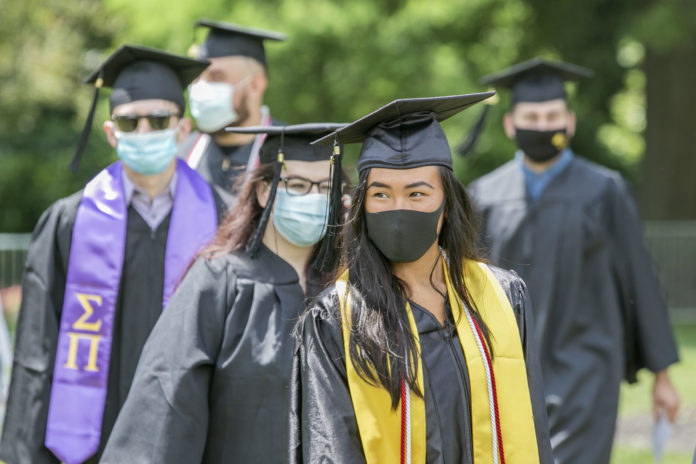
With all the minute changes the COVID-19 pandemic has brought to everyday life, it’s no surprise that major life events are bearing the impact of the precautions and restrictions that have been put in place.
For college students, that major life achievement is graduating, commencement ceremonies and beginning a career that could be said to be the start of “real life,” a life that no longer (for some) involves institutional learning.
When COVID-19 canceled in-person classes, Hollybash and many other events and meetings, the question of what would happen to commencement remained at the forefront of students’ minds.
Rowan did host a virtual commencement featuring several guest speakers who had planned to come to campus in May, but the nature of the prepared video left many students yearning to have their name called at commencement and to walk across the stage to receive their degree. Seemingly, COVID-19 had taken the opportunity for graduates to savor that moment they had worked so hard for with friends and family.
However, this moment wasn’t completely taken by the coronavirus. Rowan was fortunately able to hold three days of socially distanced commencement ceremonies for any graduates who wished to attend.
“It was really nice, well thought-out,” liberal studies graduate Nick Neville said of the ceremony. “I’m happy they were able to give us something, ’cause for everybody else to be able to graduate normally, have a whole big procession and everything, and for us [class of 2020] to not ever have anything would be really upsetting.”
Lauren D’Agostino, an elementary education and writing arts graduate, sympathized with Neville’s sentiment.
“I liked being able to hear everyone’s names called. I feel like that’s a really big part of graduation… that’s something that we’ve been working towards for a really long time, so being able to hear everybody’s names and walk across the stage was a really great thing to be able to do,” D’Agostino said.
Virginia Alalouf, an elementary education and writing arts graduate with an endorsement in special education, felt that Rowan’s approach to an in-person commencement was successful both for her personally and for ensuring everyone’s safety.
“Commencement for me was just as special [as if it] had occurred at its normal time in May,” Alalouf said. “I remember when the music began playing and walking to my seat and [feeling] so overwhelmed with joy because it finally hit me that myself and the rest of the class of 2020 truly made it.”
Moving forward into careers in the current climate is not what graduates had expected when they began their academic journeys years ago. For Neville, who wants to work as a life coach in a hospital setting, beginning a job search now is a daunting task.
“I don’t feel like going out to search for jobs when [I’m] not sure if the job’s going to be there in two, three months if this comes back or something, so I’m just kinda riding out unemployment for the summer,” he said.
For Alalouf, the search for a job has been stressful, as most things have been in the pandemic. “The main difference is participating in interviews over Zoom calls versus in person,” she said. “However, I think it’s also helpful because I’m in the safe space of my home to collect and gather my thoughts to make sure I give these interviews my all.”
“In education, it’s really hard right now because we don’t know what the new school year will bring,” D’Agostino said of her job search. “But I have been looking, there have been some openings, so I have been applying. But it has been difficult not knowing what’s to come this school year.”
As an education student, D’Agostino spent the past school year in a classroom getting hands-on experience with teaching and implementing what she learned in college with real students. It was a new experience for her, and coronavirus only helped with her ability to be flexible in her career.
“Going from a classroom of students to then making lessons online, you immediately had to change everything you were doing,” she said. “So, I definitely feel like in the classroom in the future, I’m going to be able to do the same thing. If something’s not working in the classroom, I’ll have that flexibility to just adjust the lesson right then and there and make it work for all my students.”
“We’ve never done anything like [teaching a class] up until this point, so having this added hurdle really just for the future, I feel like it makes me better prepared,” D’Agostino said.
Alalouf, who also experienced the shift of teaching in person to online, experienced several positives and negatives with the switch.
“I unfortunately wasn’t able to finish out my [teaching] clinical with my students face to face, and also couldn’t complete my special education clinical,” Alalouf said. “However, if there’s one thing I’ve learned at not only Rowan, but in my life, it’s that you have to learn to adjust and evolve in times of adversity. While I couldn’t see my students face to face in the classroom, I got to learn the ropes of how remote learning [works].”
Neville also reflected on how COVID-19 has impacted his approach to his career going forward.
“It’s made me more flexible, but also more understanding that anything can change at any moment, and you need to be flexible in knowing that your job can go away if anything like this ever happens, and always having a back-up plan ready,” he said.
“I think the best thing that’s come out of it is just being able to adjust to a situation,” D’Agostino said. “Obviously nothing like this has ever happened in any of our lifetimes, so I feel like now I’m just ready for anything, like I can adjust to anything at this point.”
For comments/questions about this story, email features@thewhitonline.com or tweet @TheWhitOnline.




